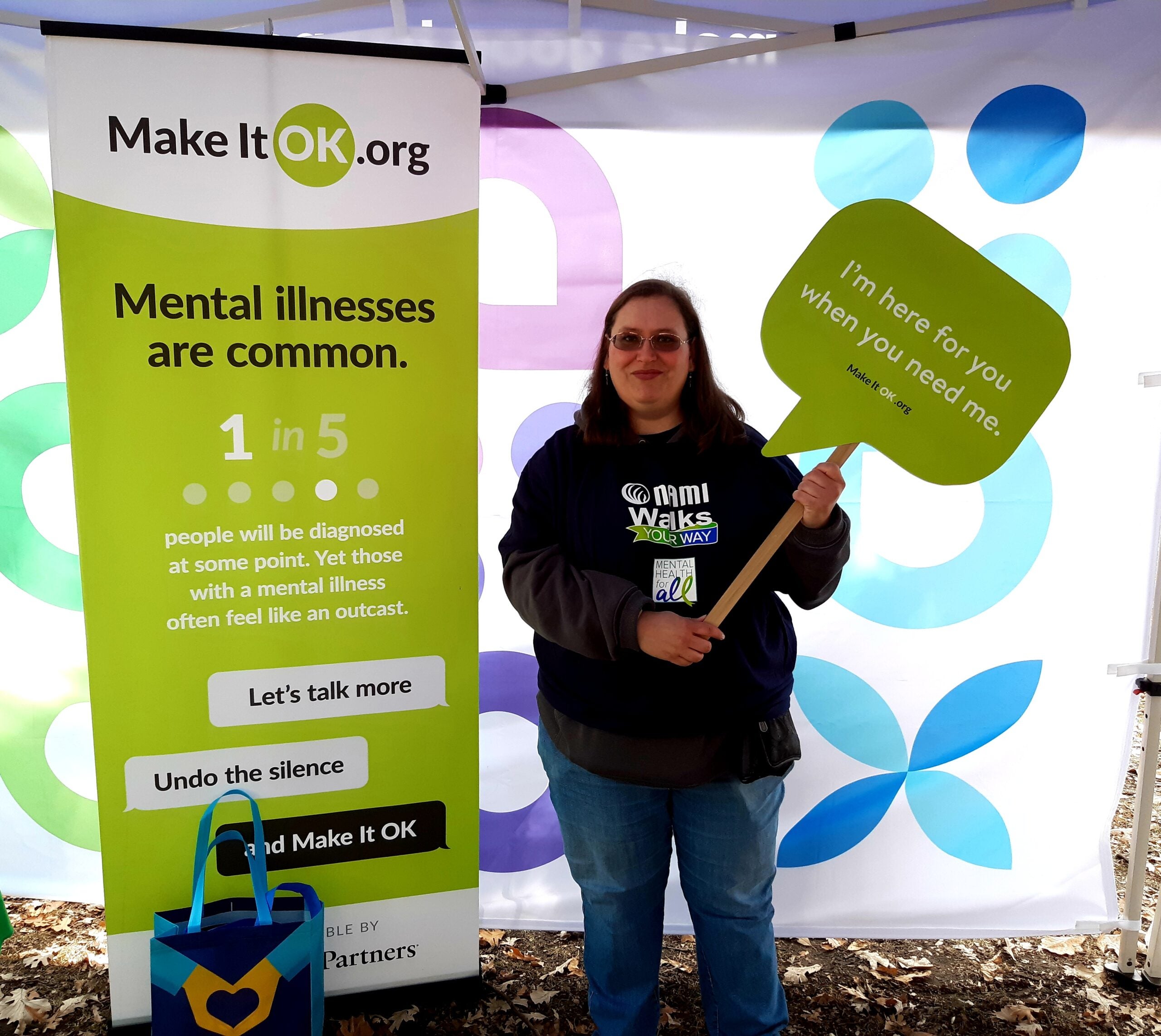When Chrissy Barnard faced a mental health crisis and most needed care, law enforcement handcuffed her, placed her in the back of a patrol car and drove her five hours to Wisconsin’s only state-run mental health facility for the general public.
Barnard remembers the patrol car’s cold seats. She would eventually have her shoes confiscated, presumably so she couldn’t hang herself with the laces.
The 330 miles between Barnard’s hometown of Superior, Wisconsin and Winnebago Mental Health Institute near Oshkosh made it difficult for her loved ones to comfort her in person.
News with a little more humanity
WPR’s “Wisconsin Today” newsletter keeps you connected to the state you love without feeling overwhelmed. No paywall. No agenda. No corporate filter.
Barnard — who was diagnosed with bipolar disorder, anxiety, post-traumatic stress disorder and borderline personality disorder — stayed there for months and saw her family just three times, she says.
About 15 years later, after getting the help she needed, Barnard is now a peer support specialist with the National Alliance on Mental Illness, or NAMI, Wisconsin. She’s among many calling on lawmakers to overhaul an emergency mental health system that she says poorly served her and many others.
Mental health crisis services in Wisconsin operate on a county-by-county basis, yielding wide disparities in care. With few exceptions, counties lean heavily on law enforcement to detain people during mental health emergencies — in which a person is considered a threat to themselves or others — and transport patients to receive care.
The nearest treatment facility might be hundreds of miles away for some rural residents.
Aside from the Winnebago County institute, the state runs only one other mental health facility: Mendota Mental Health Institute in Madison, which primarily serves people involved in the criminal justice system.
“The whole system needs to change, because it’s so traumatizing. You’re treated like a criminal from the get-go,” says Barnard, who earlier in her life was hospitalized for mental health challenges in Wisconsin and Minnesota more than 30 times.
She has company in pushing for change, including other advocates, mental health practitioners and law enforcement officials. Citing examples in neighboring states, the coalition calls for Wisconsin to build new regional mental health facilities, add care options outside of lengthy hospital stays and fund teams of mental health experts to respond during emergencies — lifting such burdens from law enforcement.
“The system we currently have right now for emergency detention in Wisconsin is broken,” says Wisconsin Attorney General Josh Kaul, a Democrat who in 2019 convened a summit focused on solutions. “And we need to find alternatives.”
In his 2021-23 biennial budget, Democratic Gov. Tony Evers proposed more than $17 million for such an overhaul, but the Republican-led Legislature rejected the proposal among hundreds of others from Evers. Republican lawmakers have expressed support for regionalizing mental health crisis services, but $10 million allocated for doing so remain tied up in bureaucracy.

Few resources in rural Wisconsin
Wisconsin is among few Midwest states that still rely on individual counties to deliver emergency mental health services. Iowa, Minnesota and Missouri have regionalized mental health crisis services to various extents, while Ohio and Illinois have adopted hybrid approaches, says Dr. Tony Thrasher, medical director of crisis services for the Milwaukee County Behavioral Health Division and president of the American Association for Emergency Psychiatry.
“In that way, you can spread out the care,” says Thrasher, who advocates for a regional approach in Wisconsin that would include making sure that each region has a psychiatric hospital and other services.
“Instead of doing this with 72 different counties, turn us into four or five regions where the counties can work together,” he says.
Wisconsin sends some mental health funding to its counties. But sparsely populated rural counties lack funds to build crisis centers or hire specialized staff, says Thrasher.
That is the case in Barnard’s home county of Douglas, necessitating her journey to Winnebago County. It’s even more complicated these days for some Douglas County patients, since they live near the Minnesota border, Barnard says; they might end up in hospitals in Rochester, Minnesota or Fargo, North Dakota and later struggle to find transportation home.
In Minnesota, higher-population counties typically operate their own emergency mental health services, while rural counties often pool their resources to offer regional care, according to the Minnesota Department of Health Services.
Illinois is divided into five regions for the purpose of emergency mental health services, offering nine state-operated hospitals, more than 30 community hospitals with psychiatric units and more than 162 community mental health centers and agencies.
Mental health calls distract law enforcement
Thrasher says residents need better options than simply “call police.”
Relying heavily on law enforcement to respond to mental health emergencies distracts them from other public safety duties, Kaul told Wisconsin Watch.
Officers seem to agree. Most respondents to a 2019 Wisconsin Department of Justice survey of police chiefs and sheriffs said that mental health interventions requiring detention ate up too much time. Of 354 respondents, 96 percent said that additional mental health facilities and transportation options outside of law enforcement would likely improve the process.
Law enforcement officers first respond to mental health crises across most of the state. But trained medical professionals can defuse a mental health crisis in most cases, while law enforcement may escalate threats due to a lack of training, according to the American Psychological Association.
Some of Wisconsin’s more populous communities, including Madison and Milwaukee, are shifting such duties to trained civilians.
Madison’s Community Alternative Response Emergency Services, or CARES, program responded to 935 calls in its first year of operation and resolved most situations on scene, according to a report released in November 2022. CARES provided in-person help and transportation in 31 percent of instances, and just 3 percent of calls required police transfers.
In search of short-term options
And for patients who require care following a crisis? They need options outside of Winnebago County, overhaul advocates say.
Across much of Wisconsin, law enforcement and others who respond to mental health crises face a binary choice between emergency detention or no intervention at all, says Kaul. But investing in short-term inpatient facilities, psychiatric emergency rooms and receiving centers could give responders useful middle ground.
In Madison, that includes University Hospital’s 20-bed psychiatric inpatient wing where patients who may not require a longer hold can receive care for just a few days.
“A lot of people in crisis can turn around and feel markedly better in 24 to 48 hours, it does not require a lengthy inpatient stay,” Thrasher says.

Republicans nix Evers proposals
In his last budget, Evers proposed funding a variety of services that mental health advocates and law enforcement representatives support. He sought $12.3 million over two years to build up to two regional crisis centers — each with crisis urgent care capabilities, a temporary observation center, a 15-bed stabilization facility and at least two inpatient psychiatric beds.
Evers also proposed $5 million to create five regional crisis stabilization facilities for adults voluntarily seeking care. The centers would offer 16 crisis stabilization beds for “less traumatic” and more “community-based care in the least restrictive setting,” according to his proposal.
Republicans leading the Joint Finance Committee stripped each proposal from the budget that Evers ultimately signed.
The committee did include $10 million for “regional crisis services or facilities” in its supplemental budget, but those funds have yet to be released. State law requires agencies designated to receive such funds to request their release and justify the need. In this case, that’s the Department of Health Services.
The department has twice requested meetings with the joint committee for this purpose, once in January and more recently in December. The committee has yet to hold a meeting, an Evers spokesperson told Wisconsin Watch on Dec. 19.
Sen. Howard Marklein, a Spring Green Republican who co-leads the Joint Finance Committee, declined to comment for this story. But his office later provided Wisconsin Watch a Dec. 21 letter to DHS in which the Joint Finance Committee accused the agency of failing to detail how it would use the $10 million.
“We have, instead, resorted to requesting information on uses of the funds from stakeholder groups because your agency is unwilling to provide basic information,” says the letter, signed by Marklein and his co-chair Sen. Mark Born, R-Beaver Dam.
“Our goal is to ensure the $10 million dollars is used in the most effective way possible so as to have the largest overall impact,” the letter adds.
The Joint Finance Committee supports a regional mental health crisis model that would include crisis urgent care and observation centers, the letter says, adding that committee staff would reach out to DHS to set up a meeting.
Outside of the budgeting dispute, the Evers administration sought to help counties by requesting federal reimbursement for counties that transport Medicaid recipients during emergency detention. But the Centers for Medicare and Medicaid Services denied the request, saying it would violate the Social Security Act, Evers’ spokesperson says.
Evers plans to unveil his next budget on Feb. 15, following a set of public listening sessions.
“Gov. Evers remains committed to improving our crisis response system, but we don’t have to wait until the next biennial budget passes to do so,” Evers’ office tells Wisconsin Watch. “There are $10 million of taxpayer money sitting idly in an appropriation controlled by Republicans on the Joint Finance Committee, and it’s time for them to release those funds.”
Mental health healing allows advocate to help others
As she looks back upon the dark chapter that her mental health struggles dominated, Barnard feels grateful for her progress and stability.
“I ended up losing my house and my job and my fiancé and all kinds of things,” Barnard recalls. “I lost basically everything, my pets, everything.”
Barnard now owns her own home in Superior, where she lives with two cats and a dog. She has spent 12 years working for Essentia Health, an integrated health organization serving patients in Minnesota, Wisconsin and North Dakota. Her recovery made that tenure possible.
Barnard now sits on the board of directors for NAMI Wisconsin, which in 2019 named her “Peer of the Year,” and she serves on a variety of councils, task forces and peer support groups related to mental health and recovery.
“I like to advocate for mental illness recovery wherever I go,” she says. “Because I know from personal experience that recovery is possible.”
The nonprofit Wisconsin Watch (www.WisconsinWatch.org) collaborates with WPR, PBS Wisconsin, Milwaukee Neighborhood News Service, other news media and the University of Wisconsin-Madison School of Journalism and Mass Communication. All works created, published, posted or disseminated by Wisconsin Watch do not necessarily reflect the views or opinions of UW-Madison or any of its affiliates.
If you or someone you know is struggling or in crisis, help is available 24/7. Call or text 988 to reach the 988 Suicide & Crisis Lifeline, or use the chat feature at 988lifeline.org.




